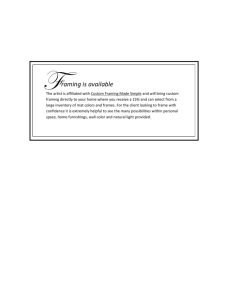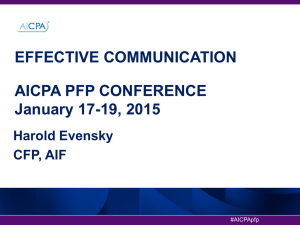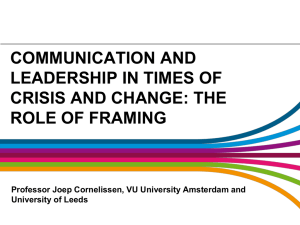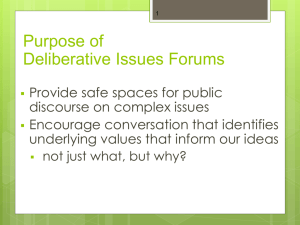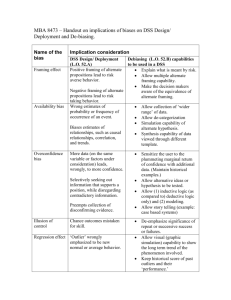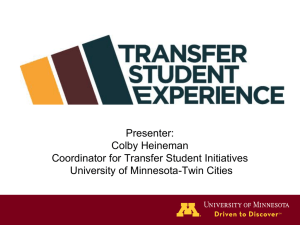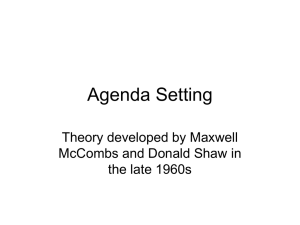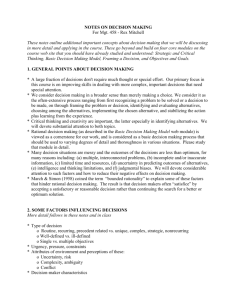Strategic Issue Identification - University of Wisconsin
advertisement
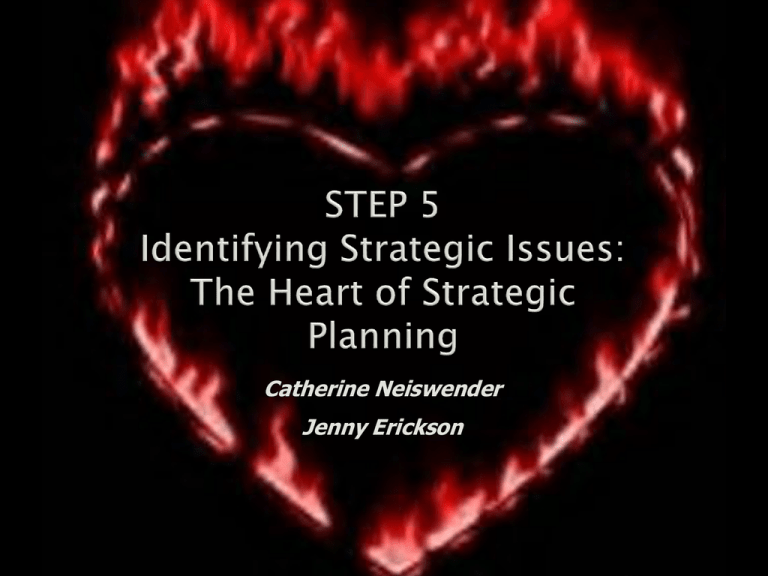
Catherine Neiswender Jenny Erickson All the data generated and process has led to this point The issues identified during this step represent those the organization believes will significantly affect its future. ...a fundamental challenge affecting an organization’s mandates, mission, product or service, clients, costs, financing, organization or management about which something can be done. A strategic issue is different than an ‘operational’ issue. University of Wisconsin-Extension • Cooperative Extension © 2001 ..is likely to confront the organization sooner rather than later. Being an immediate crisis doesn’t necessarily make it strategic. .. if not addressed, will not significantly affect major organizational features such as mission, product or service mix, etc. How Do You Know When You’re Strategic? When will this issue affect your organization? What kind of an impact will it have on your organization? Will addressing this issue require a new service, product, staff, and/or significant increase in financial resources. How Do You Know When You’re Strategic? How apparent is the best approach to resolve the issue? Is the issue politically or socially volatile? Is there major financial risk? Is the issue on the radar screens of powerful stakeholders? Internal Weaknesses Addressed: Try to do too much given size of staff Inadequate size of staff Don’t plan ahead- lack of vision and work plan Internal Weaknesses/External Threat Addressed Our endowment is too small We don’t have a good way to recognize donors We’re competing with other environmental organizations for resources External Threats/Internal Weakness Addressed The best board candidate are committed to other boards Our funders would like us to have a stronger board Board lacks capacity to govern Sticky Note/Issue Theme: Developing a culture of serving needs of students Strategic Questions: How respectful are we to students? How effectively do we respond to legitimate student needs and concerns? How “student friendly” is our campus? Strategic Issue: How can we create a campus spirit of responsiveness to legitimate student needs and concerns which would increase student satisfaction with their UW Fox experience? Strategic Goal: Enhance a campus spirit of responsiveness to legitimate student needs and concerns which would increase student satisfaction with their UW Fox Valley experience. Its an Art Important because it can drive the solution space Useful in addressing conflict (re-framing) Takes time Can happen at several points in this Step We need “butts in the seats!” The Issue: How can we better advertise and promote our programs? The Issue: How can we develop a performance arts program that the community enjoys? Availability Dorms Bars Drinking on Campus Abuse Driving Sale to underaged kids Second language skills Level of incoming students Curriculum flexibility Academic Standards Remedial Math Expectations of employers Issue Framing Worksheet Framed as a question Range of Solutions/Solution Space Consequences of this Framing Example: How can we Example: keep the bars from selling outreach/education to too much alcohol to kids? bars, legislation/policy Example: may be very difficult, politically challenging, up against the Tavern League, may drain the org’s resources Framed as a different question Range of Solutions/Solution Space Consequences of this Framing Example: How can we keep kids who have had too much to drink from driving and endangering themselves? Example: can focus on alternative transportation methods, peer pressure among students Example: peer pressure is known to be effective, easier to make partnerships with other modes of transportation providers Indire ct Goal s Visio n of Succe ss Oval Mappi ng Issue Tensio nsSystem s Analys is Direct Strategic Issues Review mandates and mission, and SWOC Generate issues, stated as questions with more than one answer. For each issue, or group of similar issues ask: ◦ What is the issue, stated as a question? ◦ What factors make it strategic? ◦ What are the consequences of not addressing it? Remember to use the Litmus test University of Wisconsin-Extension • Cooperative Extension © 2009 Group Exercise (S5-8) 1.) Review mission and SWOC themes 2.) Brainstorm a list of five strategic issues (phrase as questions) 2.) Use the litmus test worksheet to determine if the issues are operational or strategic 3.) Use the issue framing worksheet to clarify or reframe issues 4.) Use a decision matrix to select ONE strategic issue
